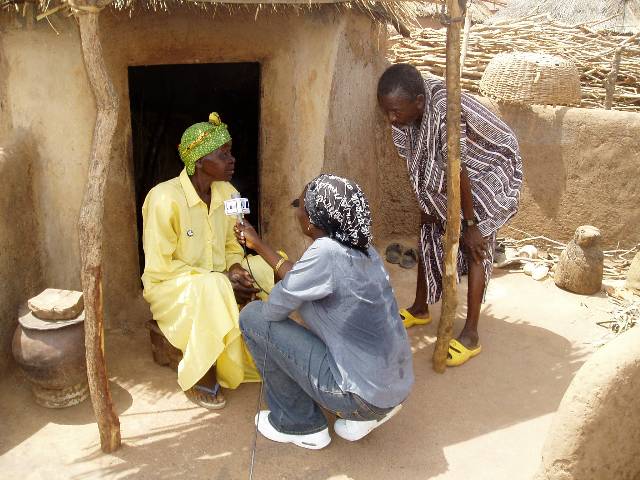In 2005, Ramana Shareef, a jhr-trained journalist at Metro TV, reported a story on the Gambaga Witches Camp in an attempt to personalize the elderly women that had all been banished from their villages. Because of the stigma that surrounds witchcraft in Ghana, many journalists refuse, in fear, to report on the topic. Shareef claims she was the first Ghanaian reporter to set foot in a “witch camp”.
Hawa Mahama, an 81-year-old woman who was exiled from her village after being accused of witchcraft, returned home two months after Shareef’s story was published. Because of Shareef’s story, Mahama was rescued by the Ministry of Women and Children’s Affairs and was given money to assist her in a reintegration program. After Shareef’s second visit to the Gambaga Witch Camp, she stated, “In Ghana, we always explain things by saying ‘it’s tradition’ or ‘it’s our culture,’ but for these women, it’s not a matter of tradition or culture, it’s a matter of human rights.” Although it is seemingly safer for the women to live in the “witch camps” than in their own homes, their stories often went unnoticed by the local media.
With the encouragement of jhr, Shareef helped to change that. Read the original article below
Inside the Witch Camp
By Bonnie Allen and Ramana Shareef, Metro TV, Ghana
Hawa Mahama is old and weak. She has no one to help her and no where to seek comfort. The 81-year-old woman was banished from her village. That is the fate of many poor, elderly women in Ghana. They are accused of witchcraft, then ostracised, beaten, or even murdered. “People abuse their mothers and their grandmothers. It’s the poor old women,” explains Ebenezer Adjetey-Sorsey, executive director of HelpAge Ghana, a non-governmental organisation in Accra that fights for the rights of the elderly.
A 13-hour drive north of Accra, in the village of Gumbaga, there is proof that elderly women, often widows, are vulnerable to human rights violations. The so-called “Gumbaga Witchcamp” is one of four outcast homes in northern Ghana, and houses about 150 women. Hawa Mahama sought refuge here after being accused of killing and eating a child in her village. Other women were blamed for illnesses, accidents, crop failures, financial misfortunes, and even impotence. The camp itself has been controversial, likened to a slave camp or prison for witches. But a 1997 investigation by the Commission for Human Rights and Administrative Justice (CHRAJ) concluded women are not subjected to any maltreatment, and in fact, the camp protects women from possible death in their village.
Adjetey-Sorsey considers the camp a “lesser evil” and says the real crime is committed by people in villages who take the law into their own hands. “Yes, believe in witchcraft. That is fine. But people are using witchcraft to disinherit older women, or to abandon them so as to avoid supporting them.” It is a constitutional right in Ghana for citizens to practice religion, and believe in witchcraft, but the constitution clearly stipulates such a right does not empower anyone to violate the rights of others. And while the women at Gumbaga have escaped physical harm, they still suffer. Sadness. Loneliness. Helplessness.



